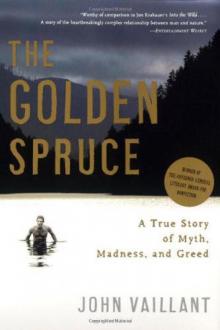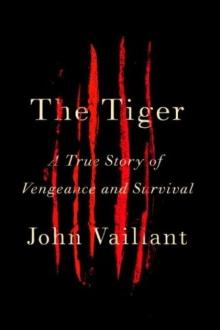- Home
- John Vaillant
The Jaguar's Children Page 23
The Jaguar's Children Read online
Page 23
28
Sun Apr 8—04:43 to 12:47
My abuelo is here with his special stone, the one he found when he was plowing. Too old to have a name but heavy with a hole it. You hold it to the sun so the rays come through. Can you see this? Burning a hole into my head so you and God can see inside.
Tengo otra confesión.
I had a dream last night he reached into my mouth. I thought it was my own hand. I knew it was César only after—not by the sound he made because it was not the sound of a man but the sound of an animal—an animal choking on sand. His fingers were hard and his hand was clumsy, searching I think for something wet. I know because all of them were searching for this and I must have pity, but in that moment, in the dark, I was scared out of my mind. My mind is not working properly and I bit him. Without thinking, in my dream, I did this. It is wrong, I know, but it was like being a baby again—how they take without thinking. How they take like the world owes it to them. That is the kind of thirst I have. I could not stop myself, and I could not be stopped.
My tío tells me a drowning man will do like this—will climb over his own mother to only breathe. “I have seen it myself,” he says. “Once, in the Río Bravo.”
So hard to know now what is me and what is him. But it was there, in that moment of the taking that we crossed over.
These are messages coming down to you from the cross on the mountain. But you are safe there on the other side—and merciful, I hope, because I am needing some of this right now—
Dominus noster Jesus Christus te absolvat—
Sí. Por favor. Amén. But how can one absolve—or punish—this? The body wanting to live? Only if life is breathing and nothing else am I alive. My mother would not know me now. Chamaco she called me—Diablito. Then she was just angry. Now it is a prophecy.
***
Dark and water everywhere. Water spirits coming in the night when it gets cold, coming into me with every breath. I can feel them all around me now, rolling down the walls, onto my hands, my tongue. They have been trying to tell me all this time—we are being made into something new. So we can travel through the pipe, and join the others.
It hurts so much to do this, to leave the body—cramps and cold and cracking open, bones too big for the skin.
***
Riding Tío’s bicycle with Isabel following on a rope. We pass a man pulling a wagon with a white dog in it. Behind him is that silent viejo who lost a duel and also his hand so he must carry the basket balanced on his sombrero. And over there, in the field behind the school, a horse is walking with an egret, matching their steps like old compañeros in an old conversation. In the shadow of the church I see one brother sleeping in a wheelbarrow and the other sleeping on a shovel. And every year at Eastertime comes that same Nazareno with no shoes and no hat dragging his cross down the road going who knows where, passing again and again that same burro on the roadside with a circle of vultures on her like they are at the café drinking micheladas.
I knew all their names once, but not anymore.
***
I taste of blood and rust and dying. This mezcal is not agreeing with me. And that itching in my legs, deep in the bones—something is crawling around in there trying to get out and there is no way I can reach it. It is telling me to tear my skin apart and I am trying not to listen.
They are watching now, all of them, to see what I will do, but in their eyes instead of eyes are the little metal covers you see in the sidewalk saying AGUA. These are the signs telling you what is really important, medallions for the saints, por Santa Agua. Breathe her name over and over as I do now—AGUA—Agua—agua, and you will know the prayer of death and wanting—living and dying all in one small word—the One Word which is not a word at all but only a sound in the throat.
César is here next to me and his AGUA eyes are the old kind with stars on them. They are glowing red hot. I believe this is the sign of anger.
***
It is coming alive like the jungle in here. We are evaporating in a hot cloud and flies are everywhere, or maybe they were always here, waiting. Other things are coming too and for them it is a feast. But I have only thirst. I am shivering from the heat. The light in the pipe is one star in a black sky and someone is howling at it. Maybe you can hear me.
***
Señor Cacahuate, the peanut man, smiles in the corner with his stick and hat and funny eye. He is showing us the painting, the old one from church of the peanut truck with the words on the side—LA TENTACIÓN MÁS GRANDE. And up on the ceiling in that lonely cloud is the hand of God reaching down. All this time Señor Cacahuate reads the words “La Tentación Más Grande—La Tentación Más Grande,” over and over, until I understand that yes, the temptation is too great and this is why He takes the peanuts.
All but one—the one He does not want.
***
I am awake now and it is better, talking to you. When I get out I will show you my country—César’s country. We can drive the Apache to the coast and see the frigate birds with scissor tails hang still in the air, the clouds racing by above them, and the secret spot south of Puerto where I saw the pelican king with his medallion. Even gringos saw it so it must be real, taking photos as he flew away, chain swinging. And maybe las tortugas. Two days it takes them to make love. I have seen this with my own eyes—just floating and floating like we had all the time—water and sky with only the two of us between. And the babies so sweet and small and sad—perfect in your hand. But into the ocean they must go, and there is nothing more sweet or small or sad than a baby tortuga facing the ocean for the first time.
All the others managed to get out, why not me?
***
Yes, I know. I can see you there. You’re taller in person and even more beautiful. Is it the light or my eyes? Your hands and face just floating there. Are you here for the judgment? Are you looking for your son? I’ve said too much already. How did you get in?
The same way they got out. Everyone but me. And now I know why.
Yes, I traveled to the pyramid. I climbed the steps one by one. My feet were wet from the blood—the stones so slippery I had to use my own two hands, fingers in the cracks. I will never forget the sound—and that plane with all those faces in the windows, looking without seeing.
My ears are ringing—humming.
I can hear the organ grinder, but I can’t see the monkey.
***
There is a page missing from the codex, but I have found it on this wall that wraps around us like the belly of an animal. In the place of words is a jaguar, and in the place of spots are drops of water saying in a thousand different ways, as clear as any voice, for everything that lives, water is the one true thing.
Someday this missing page will be painted where everyone can see it, and there, we will see ourselves reflected—
a jaguar
a water truck
a loaf of bread
a bag of seeds
green shoots pushing through the ground
small black birds escaping
one last bird remaining
a list of questions
Was he too big, or the wrong shape?
Was he too bad, or the wrong color?
Is he waiting for something? Or someone?
And the corn that has been growing all this time.
***
Are you the thing you want most, or its opposite? If I want nothing more than water, is it because I am water? Or because I have none? If I want nothing more than love, is it because I am love? Do we always want more of what made us? Is what we are what we need?
Maybe I can give you these. Maybe this is why you’ve come. After all this time.
I understand now that all water is holy and that we are made to drink and to love another. I love you. I do. That is what these words are. But is it because you are here, a being in the universe receiving these messages? Or because I hope you are? Is it only because I want to be saved? And to be saved—to be permitted to live—
to drink and to love—is what I want more than anything besides a pool of clear water. I know this question is a circle, a deep round pool, and I am drowning in the answer.
Whose white hands are these? I don’t know.
Only that when she holds me the pain is not so much.
All things are mine since I am His
How can I keep from singing?
***
There is a breathing in the pipe. Is it you? When you are what I need now more than anything but water. And that same dry sound—the sound of dying. All my water deep inside me now. Only the pipe and what it says.
Its breath—coming and going, in and out. The tank alive now after all, full of us and what we are. A sound from deep in the throat.
Like some stories my abuelo told me.
It’s on top of us. Hands. Feet. Paws. Soft pats and the scratching of claws so loud inside my skull. The itch in the bone I cannot reach. The blades in my back. More breathing in the pipe and the paws again, trying to get in—the sound the heart makes beating in the body—so close I can almost touch it. Claws and teeth, a stone blade catching on the bone.
What this creature is wanting.
Saying.
No. All of us are gone.
. . . in this world so much letting go.
Always and forever.
Ya terminé . . .
Ringing—
a ringing
a ringing in my ears
but no answer
Epilogue
Partial transcript of an interview conducted by John Bernard (Pima County Monitor) with wildlife managers Ted Harvey and Calvin Wills, Arizona Game and Fish Department.
April 11, 2007
JB: So, how did you find them?
TH: Well, it wasn’t us, it was A2—we call him Alvin—
CW: Rhymes with Calvin.
TH: He’s our latest, must have just come across. We’ve only had a collar on this guy for about a week, trying to figure if he’s a transient or if he’s going to stay and make a go of it. The males are typically moving quite a bit so when they stop for more than a day it’ll mean one of three things: he’s sick, he’s shot or he’s made a kill. Only other possibility is he’s found a mate, but that’s not likely this far north. Hasn’t been a female sighted in Arizona since the sixties—
CW: That’s what you call a dry spell.
TH: But we worry when the signal stops moving because it’s tough out there—all kinds of people willing to shoot a jaguar. There’s narcos would love to have one of these guys on their wall and there’s a lot of ranchers have a NIMBY attitude toward any kind of predator. You know, “shoot, shovel and shut up.” Indians might have some reasons of their own, but I can’t speak—
JB: So, you found them when?
CW: He’s wanting to know about the truck, Ted. Sorry. With us it’s all about the cats.
TH: I’m sure you know illegals are a dime a dozen out here. They’re trashing the desert like you wouldn’t believe and it’s very disruptive to our work, especially when you’re dealing with something as shy as a jaguar. Mostly, we try to work around them.
CW: So I was checking for signal that morning—Easter—and Ted was late coming from church. I picked up Alvin’s signal right away, checked the GPS and saw he’d been in that spot more than twenty-four hours so we packed up the gear and went. The nearest road is two miles away so we parked the truck and walked in. We had our packs, radios, camera, GPS, a rifle with tranquilizer darts, and Ted’s carrying a sidearm ’cause you never know who you’re going to meet out there these days. That area—Altar Valley—is wide open semi-arid desert; you’ve got ocotillo and mesquite, some barrel cactus and saguaro, but it’s pretty fast going. That’s why it’s a highway for illegals, and with all that foot traffic it gets harder to track an animal. Lots of tire tracks too, lately. A mile or so in—we’re maybe a mile north of the border now—we spot a little grove of ironwood and paloverde in a low spot off to the southeast. Looks like a wash. There must be some decent water underground because the trees are old and there’s a couple of good-size saguaros, so now we’re pretty sure we found our cat. We head over that way and when we’re about two hundred meters out we get down and check his signal again. He’s still there, hasn’t moved at all. It’s a good place to lay up, cooler in there, so we’re thinking he must have a kill, a nice javelina or something. There’s a little breeze out of the east so he won’t be winding us, and we creep up on him, belly-crawling—
JB: And the truck?
TH: Almost there, chief. Anyhow, I saw it first—the vehicle—and I told Cal to hold up. Said we got company, smugglers for sure, but you can’t tell if it’s drugs or people. Makes a difference, safety-wise. If it’s mota you’re trying to save your life, and if it’s tonks you’re probably going to have to save theirs. Now, you got ’em both together sometimes.
CW: Hell, these days you can get shot by one of your own.
TH: Happened more than once, I’m sure. Either way, we can’t figure what Alvin’s doing. Did someone shoot him and dump his collar? Is the vehicle abandoned? Nothing’s making sense. So we move in a little closer, but it’s still as death in there. Not a sound, just doves and quail. Well, we don’t want to be ambushed, but at the same time, you been out here a while you can kind of feel if you’re alone or not. And this one here is feeling pretty darn lonely.
CW: We get to fifty meters out—close—and we can see the truck back there in the trees. It’s some kind of tank truck—old—not the kind of thing you usually find out here. There’s writing on the side—looks like graffiti, but the vegetation’s too thick to make it out. You can see how they’d miss it from the air. Anyhow, we’re hoping it’s our cat in there so we move around to the west, downwind, and when we’re thirty meters out, that’s when we start smelling it. A jaguar’ll eat damn near anything if he’s hungry enough, and now Ted and me, we’re going the same place with this—we’re thinking Alvin’s on some carrion. Corriente steers’ll hide out in places like this, maybe antelope, but so will a Mex, and with that truck there, well, you can imagine what we’re thinking. In twenty years I’ve seen a lot out here, and a lot of changes, but this would be a first. I loaded a dart and Ted’s got his Glock in case there’s something more than Alvin in there, and we shout then, calling Alvin’s name ’cause we’re wanting him to move now.
TH: Nothing happening so I throw a handful of rocks. Well, that rousts him up and he’s not a happy kitty—he’s growling. Usually, if you spook them they’ll just take off and you won’t know where they went, but you can tell this guy doesn’t want to move. He’s definitely got something in there and he ain’t sharing. We stand up so he can see us, see we’re bigger than him, and we walk in like that, noisy and close together. You can really smell the meat now, like roadkill and outhouse mixed together, and we can hear movement by the back of the truck. It’s Alvin and he’s growling, just low and steady.
CW: I’ve got the tranquilizer ready and we’re skirting around to the south, looking for an opening, and there he is in the wash. He’s standing in the bare sand by the back of the truck. Looks like a water truck; you can see the pipes there just above Alvin’s head. Well, Alvin isn’t budging and I said to Ted, “I guess he thinks that truck is his.” We’re looking all around for the carcass because we know it’s somewhere close, but there’s nothing—not under the truck, not anywhere. It’s weird.
TH: I was thinking it must be further back in the trees or maybe he drug it up in the branches, but that’s a leopard trick; onca doesn’t normally do that.
CW: It’s in the wash we see the first fresh man tracks mixed in with Alvin’s; not old—no more than a few days. Looks like two guys and they’re heading south, beating it back to Mexico. Hell of a place for engine trouble. We’re not worried about narcos anymore because no Mexican’s gonna stick around with this guy. We’re maybe fifteen meters off now and I’m waving my arms trying to get him to go. But you kind of hate to, because how often do you get this close to a jag
uar? Not often, I’ll tell you that.
TH: Heck, never, unless he’s dead or you dart him.
CW: And he sure won’t just stand there like Alvin is. I’m wondering if he isn’t sick. Rabid maybe. So I took a knee then and sighted the rifle, but I’m saying, “Let’s just watch him a minute.” Well, the way he’s pacing back and forth, glaring at us and growling, he sure doesn’t look sick. He looks mad! And I said to Ted, “I do believe old Alvin’s giving us the stink-eye.” It was the first time we’d seen him since we collared him, and he is a specimen—healthy like you read about. You see him out there in all those pale browns and greens and him so bright and vivid, the spots jumping off his body. It’s like a piece of the jungle landed in the desert, like the jaguar is more alive than everything around him—even you. Hard to explain if you haven’t seen it yourself. Isn’t that right, Ted? Ted was taking pictures like a Jap tourist.

 The Golden Spruce: A True Story of Myth, Madness, and Greed
The Golden Spruce: A True Story of Myth, Madness, and Greed The Jaguar's Children
The Jaguar's Children The Tiger: A True Story of Vengeance and Survival
The Tiger: A True Story of Vengeance and Survival The Golden Spruce
The Golden Spruce